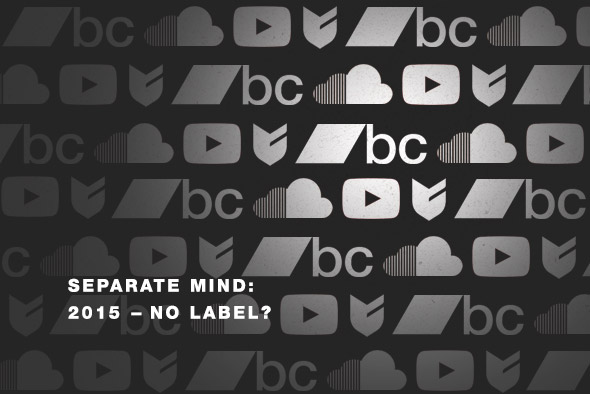Separate Mind: 2015 – No Label?
 Perc, Samuli Kemppi, and Fallow Field’s Ian Maleney speak with Richard Brophy on whether social media and new distribution platforms are threatening the role of small, independent labels.
Perc, Samuli Kemppi, and Fallow Field’s Ian Maleney speak with Richard Brophy on whether social media and new distribution platforms are threatening the role of small, independent labels.
Do we still need record labels? In a brilliant keynote address at Melbourne’s Face the Music conference in late 2014, Big Black and Shellac founder, producer, engineer and all round polemicist Steve Albini provided an upbeat state of the union address about independent music in the internet era. The speech is largely positive about the opportunities that technology affords to underground artists. If you have the time, it is well worth reading and the full transcript is available here.
The tone of the Melbourne speech may have surprised some who read Albini’s equally insightful 1993 essay, The Problem with Music. The main contention in that eloquent but ultimately bleak diatribe was that after all the costs were subtracted, members of a mid-level touring band would have to exist on the equivalent of the minimum wage. However, given that Albini argues in his Melbourne presentation that technology has allowed artists to circumvent the major label machine, which forced independent artists into an existence just a few notches above servitude, that surprise may only have been short-term.
If, as Albini cogently argued last year, major labels and the industry that surrounds them have been gutted, is there still a future for small, underground labels? He rightly points out that independent artists are able to use social media and a range of other tools including SoundCloud and YouTube to promote their music to a worldwide audience almost cost-free, but his assessment of the independent label sector during the Melbourne presentation was less rosy.
In stark contrast to the independent label network which he came up with during the ’80s and ’90s, Albini said: “There is still an independent label network, but it’s a slim fraction of what it was. The labels continuing to survive do so by supplying niche music to a discerning audience. And because they have been steeled in the art of efficiency their constitution allows them to scale everything to suit the remaining demand.”
Clearly, there are some great benefits to technology allowing artists the chance to connect directly to their audience and to circumvent the major label machine, but has this process had unintended consequences and is it endangering the future of electronic music labels? While hardly a week passes without another article cheer-leading the resurgence in vinyl, this spike in sales is benefiting heritage acts and major labels, while most electronic labels struggle to sell between 300 and 500 copies per release. With the prospect of such small physical sales, it’s impossible to imagine why anyone would start an independent label for financial gain.
Furthermore, many electronic music producers now sell directly to fans via services like Bigcartel, Discogs and Bandcamp – their recent VAT issue notwithstanding. Does this mean that while technology is helping artists to operate independently of the major label machine, it is also accelerating the pace of decline in the independent label sector?
 Apart from recording and releasing as Perc, Ali Wells has run the Perc Trax label for just over a decade. Home to artists like Truss, Sawf and Forward Strategy Group, the label sells directly to its fans. Wells is an advocate of this approach because it provides a direct connection to the label’s supporters and great financial independence.
Apart from recording and releasing as Perc, Ali Wells has run the Perc Trax label for just over a decade. Home to artists like Truss, Sawf and Forward Strategy Group, the label sells directly to its fans. Wells is an advocate of this approach because it provides a direct connection to the label’s supporters and great financial independence.
“I can charge lower prices than any vinyl shop and still make a better return per unit sold. The fact that you get paid immediately for Bandcamp sales helps with cash flow as does setting up pre-orders for larger releases,” he explains, adding “you receive the pre-sales money before release date which helps deal with manufacturing, design and promotional costs that traditionally have to be paid a long time before your distributor would pay you for the release’s first month of sales.”
Despite the upswing in vinyl, Wells also points out independent labels face other challenges. These include the need to “do something different from the labels it gets grouped with without alienating long term fans,” as well as the manner in which each release “is packaged and promoted to the non-music items the label releases, such as the artwork prints and merchandise”.
While technology offers an array of opportunities for independent artists, Wells says navigating the many options and then deciding on which ones to utilize makes the business of running a label far more complex than it used to be.
“Years ago, every label did vinyl and maybe your only decision was who should distribute it and whether you should sell T-shirts and other merchandise,” he recalls. “Now there are digital sales, direct selling options, streaming services, subscription services, SoundCloud and YouTube channels, all the social media sites and so much more to choose from,” he says. “I try to pick what will be worthwhile for the label and its artists whilst not overly time consuming. Blindly signing up to every new social media site the moment they launch is too much,” Wells explains.
Despite having all of these potential sales and promotional channels at his fingertips, as a label owner, Wells does not foresee a situation where he will only sell directly. He points out fans generally go to sites like Bandcamp because they already know what they want to purchase, and having a presence on websites like Juno, Boomkat and Beatport make the label visible to casual browsers.
“Only selling directly might bring in a short term rise in income but the lack of new people discovering the label and its artists would bite at some point,” Wells says.
One of the other reasons why Wells feels independent labels will endure is due to their ability to discover and nurture new talent. Perc Trax was one of the few labels to release material by Forward Strategy Group and he believes imprints can still play an important curatorial role.
“It is often the new producers untainted by the machinations of the music industry and the rigors of a busy touring schedule that make the most interesting music,” he says, adding “even if one demo in a hundred is something interesting, yet alone something I’d consider releasing then to me that justifies the time spent listening to demos.” Wells continues, “quite a few artists have been helped by Perc Trax and I see it as a label’s responsibility to promote new talent and not just to look at the sales charts of Beatport and Juno and see who they can tap up for some easy sales.”

One of the producers who has benefited from independent labels’s willingness to sign new talent is Samuli Kemppi. At last count, the Finnish techno producer had released material on 17 different labels. As Kemppi explains, however, he didn’t intentionally set out to appear on so many different imprints, and like so many unknown bedroom producers, he just wanted to get his music to an audience as wide as possible.
“Getting your name heard is a dream for all bedroom producers and I always thought that if someone is well known for the music he/she does, then it is for the right reason,” Kemppi explains. “I had these dreams too when I was younger. I always wished if I break through, it will be because of the music.”
At the outset, one of the challenges facing Kemppi was his geographical location and the sense that in his Helsinki base he was disconnected from techno hubs. “I wasn’t really planning or thinking much about it back then, but for someone who lives quite far away from the epicentre of techno it was just great to have tracks out on labels so I did send some demos,” he explains. A mixture of perseverance and good fortune also helped Kemppi on his ascent and after one key release, his reliance on sending demos became less important.
“I got noticed because my track “Vangel” ended up on the Berghain II mix by Dettmann and also on a separate vinyl on Ostgut Ton, so that track opened a lot of doors and then most of the label connections came without demos,” Kemppi explains.
Having appeared on so many labels over the past decade, the Finnish producer has now settled on a semi-permanent home with Italian M_REC Ltd, which late last year put out his debut artist album, The Observer Effect. Despite this, Kemppi has left the door open to work with other labels, including his own Deep Space Helsinki, which he runs with Juho Kusti, his old friend and co-presenter on his radio show of the same name.
The proliferation of such one-artist labels is not a new thing – last year, the ultimate one-man operation, Robert Hood’s M Plant, celebrated its 20th anniversary – and it’s a further consideration when discussing the future of the underground label. Although such labels don’t offer opportunities for new artists and do not have the same curatorial role that many fine labels fulfill, they do provide the level of independence and control that Albini would approve.
Kemppi’s DSH is set to release its third installment in the coming months. He explains the DIY approach offered him and his partner “full control”. Circumnavigating the distribution model, the first releases were sold directly to Hard Wax in Berlin and Disk Union in Tokyo. This approach allowed them to recoup the pressing costs faster than if the records were sold through a distributor.
“We did the first two releases locally here in Helsinki, which probably wasn’t the cheapest option, but we felt it is important to be there when the cutting is done and to see the whole process,” Samuli says. “We did small pressings, 300 copies only, and it was quite easy to sell them. It was also a learning process for us and with DSH003 we’ll do things slightly differently.”
 Like Kemppi, journalist and producer Ian Maleney also set up his own label, Fallow Field, as an outlet for his own work and to have full artistic control over how it was released. Maleney also felt setting up the label was an important move on a personal level.
Like Kemppi, journalist and producer Ian Maleney also set up his own label, Fallow Field, as an outlet for his own work and to have full artistic control over how it was released. Maleney also felt setting up the label was an important move on a personal level.
“I try to be involved in every side of music, criticising it, making it, putting it out. It gives you a great understanding of art’s function in the world if you can see it from every angle,” he says.
In contrast to many underground labels, Fallow Field is a cassette-only imprint and each release is limited to 30-50 editions. The chosen format, Maleney explains, was one of necessity.
“It is the only one I could afford. I want to make nice things that look nice. Vinyl looks nice, but I can’t afford it, so cassettes are a nice middle ground. With the cassettes, I get them dubbed professionally and I do my own artwork. I don’t have a distributor so I sell to shops directly. If I had the money, I would do vinyl in the morning,”
Apart from his own work as Be Honest, Maleney has put out over 30 cassettes by other artists in the drone/ambient/noise field. He says he never sends out demos of his work to other labels but “if another label was to ask me, I’d say yes. I’m not going to actively seek it out because if I can’t believe enough in my own label to release my own music, I shouldn’t be running it”.
With a background in punk and indie, Maleney is a fervent believer in the practice of underground artists and labels working together outside of the traditional music industry structures. In the past he has worked as part of a label collective which involved organizing record fairs and seeking to set up an umbrella organization for independent labels in Ireland. He is passionate about the concept of underground artists and labels working together.
“This should happen at every possible opportunity. There is no reason to use or rely on older methods of distribution. If you can do it yourself with people you trust and respect, then you should. People should just do it anyway, if they take control of their own music they might be more inclined to think about it more deeply,” he says, adding the Albini speech was like a clarion call for collective action.
“It was really optimistic. If we can re-focus people’s attention on art, that’s good. If we can get away from the notion we must support the music industry, that’s good as well because anyone can release records. There is so much focus among music journalists on the industry, but what of it is worth saving? We can do this on our own without sponsorship from alcohol companies,” Maleney notes.
It’s hard to argue with such sentiments, but is there a danger that in dismantling the major label infrastructure, there might be negative repercussions for independent distributors and record stores? Ali Wells says he is cautious about how he sells directly and makes sure he doesn’t act to put his own distributor at a disadvantage.
“I don’t want to piss my distributor off and I don’t sell anything directly until it is available in the main UK stores,” he says. He adds, however, it is impossible to know how direct sales are eating into traditional distributor sales and which are just new, additional sales. “If a label manufactures its own stock, then it is up to it what methods it uses to sell, though a label that is strong at direct sales might be less attractive to a potential distributor. If a distributor manufactures stock on behalf of the label via a press and distribution (P&D) deal, then the distributor can control the amount of direct sales by only giving the label a certain amount of copies of a title. Maybe just 10 per cent (roughly 30-50 copies for most labels) as a guide, to keep direct sales flowing but without too much impact on the amount they can sell.”
“ We can do this on our own without sponsorship from alcohol companies.”
Ian Maleney believes developments such as direct selling have not stopped people from setting up their own labels and feels “everyone should release a record at some stage in their lives”. Even a cursory glance at the weekly distributor lists supports the belief that there is no shortage in new labels. Unfortunately two of the main distributors we approached declined to contribute to this piece. Despite the wholesalers’s reluctance to talk, it appears the independent label sector is here to stay. In part, this is due to the opportunity technology affords every artist to publish their own work, a development that comes with a strong caveat.
“It has become really easy to start your own label and sell digitally worldwide. So instead of sending demos to labels and hoping that even 1 per cent of them answer you, it is a no-brainer to go the other way,” Kemppi says. “But there are also problems like a lack of sound quality control and shitty mastering,” he adds. “If you want to do it properly, you have to learn the basics or buy services from people who know these things”. Kemppi also thinks quantity over quality is an issue with digital labels, “getting the third promo from the same label within a week is a kind of turn off. It is great that releasing music has never been this easy, but keep in mind your product has to be brilliant to stand out from the vast sea of digital music.”
But will the new generation of music-makers heed or care for such considerations? As a child of the ’80s, Kemppi says he was conscious of the significance of releasing on vinyl, but believes for so called digital natives, this may be a less important consideration. “There will always be new scenes and in some uber-underground circles people just post their tracks to blogs and share for free,” Kemppi says.
One of the ways a new artist could stand out from the ‘digital sea’ is by pressing up their own limited vinyl and then selling it online or directly to shops – a good recent example of this approach being US label White Material. Indeed, what incentive does a new artist have to send a demo when they could set up a Bandcamp account, and sell limited vinyl runs, cassettes or digital?

“Being associated with a respected label instantly brings you a greater level of attention and the benefits of that label’s distribution and promotional channels,” Wells says. “You need a lot of luck and talent to rise through the mass of new artists just by starting your own Bandcamp page or digital-only label. The classic strategy of pressing up some white labels to build a buzz is more of a commitment though and may have a slightly greater chance of success,” he says, but warns, “for every Objekt there are a hundred artists barely shifting 50 copies of the 300 whites they pressed up”.
It’s not hard to see the advantages an independent label with a unique identity, high media profile and years of experience releasing records could have for a new artist, especially if it has an impeccable back catalogue. Ian Maleney cites PAN as an example of a contemporary ‘buy on sight’ label.
“It is an almost perfect label. The artwork is beautiful, every time. The music is strange, unpredictable and always of a very high quality, and it’s not stuck in any one genre. You get the sense this is one person’s taste and they love the music they are putting out,” he says.
Maleney also makes the point reviewers are more likely to check releases on labels they trust. “I get tons of music all the time and I’m not going to listen to it all, but if it’s on a good label, I’m 80 per cent more likely to listen to it,” he claims.
While underground music appears to have a rosy future thanks to technology, it has blurred the role of the conventional independent label. Despite this, even the most underground activists feel labels will continue to play a role in the independent sector.
“If your goal is to sell a ton of records and make a load of money, then you’re probably going to fail, but if you want to curate a nice corner of the artistic world, then you’re going to have an awful lot of fun doing it,” Maleney says. “Putting out a record is a huge undertaking, but releasing other peoples’s music is a wonderful privilege and pleasure. If you just treat it for what it is, that you’re not going to sell thousands of records, you’re probably going to be fine. “
Richard Brophy